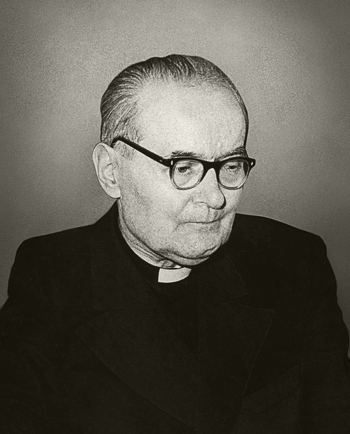
Kazimierz Kłósak – a Polish philosopher, neo-Scholastic, representative of Louvain Thomism, theologian. He was born on 1 January 1911 in Żółkiew (now located in Ukraine). He completed his philosophical and theological studies at the Jagiellonian University (UJ) where in 1934 he obtained the doctor’s degree based on the thesis “Tomizm w ujęciu Jakuba Maritaina” [Thomism According to Jacques Maritain], written under the supervision of prof. Konstanty Michalski. His philosophical views were strongly influenced by the fact that he studied in Rome and Louvain. From 1945 he taught philosophy at UJ, and from 1957 – also at the Archbishop’s Theological Seminary in Krakow. In 1951 he was asked to cooperate with the Commission of Philosophy of the Polish Academy of Learning. In 1954 he started working at the Academy of Catholic Theology (ATK) in Warsaw – he taught philosophical subjects and as the head of the Chair of the Philosophy of Nature. In 1954–1956 he was the associate dean of the Faculty of Christian Philosophy, and then, twice, he was its dean: between 1956–1957, and continually from 1964 until 1976. At the same time, in 1964–1971 he was the head of the Chair of the Philosophy of Nature and the head of the Section of the Philosophy of Nature at KUL. In 1954 he became an associate professor and in 1968 he obtained the academic degree of a full professor. In 1965, together with Józef Iwanicki, he established the semi-annual “Studia Philosophiae Christianae” published by ATK. Also, he was the co-founder of the annual Analecta Cracoviensia” published by the Polish Theological Society and the book series published by ATK between 1976–1983 entitled: “Z zagadnień przyrodoznawstwa i filozofii przyrody” [Issues Concerning the Philosophy of Nature and Natural Science]. He died on 1 June 1982 in Krakow.
Kazimierz Kłósak’s work resulted in more than 130 publications, including monographs, dissertations and handbooks. His most important works are: “Materializm dialektyczny. Studia krytyczne” [Dialectical Materialism: Critical Studies] (1948), “Myśl katolicka wobec teorii samorództwa” [Catholic Approach to the Theory of Spontaneous Generation] (1948), “W poszukiwaniu Pierwszej Przyczyny” [Looking for the First Cause] (1955-1957), “Z zagadnień filozoficznego poznania Boga” [On the Issue of Philosophical Cognition of God] (1979), “Z teorii i metodologii filozofii przyrody” [On the Theory and Methodology of the Philosophy of Nature] (1980).
Kazimierz Kłósak’s main scientific interests include the issues related to: the philosophy of nature, the philosophy of God and the philosophy of human being. Following the ideas of the Louvain Thomism representatives, he found it necessary to take into account exact sciences, mainly natural sciences, in philosophy. With such approach, he elaborated and suggested his own solutions to methodological problems (the relation between the philosophy of nature and the philosophy of animate nature), problems touching the borders of the philosophy of nature and natural sciences (the genesis of life, evolution, theological interpretation of nature), as well as the philosophy of natural science and the natural science itself.
In theodicy he discussed the opportunity to know God and analysed the arguments of Thomas Aquinas, aiming at taking into account some data related to natural sciences in them. In anthropology, he paid special attention to the question of human soul (its origin, nature, substantiality). Kazimierz Kłósak also carried out numerous disputes – with philosophical concepts (dialectical materialism, the Lublin School of Philosophy), philosophical-theological concepts (Teilhard de Chardin), and with ideas concerning nature (Alexander Oparin). His way of practising philosophy influenced a lot of thinkers of the younger generation (Szczepan W. Ślaga, Mieczysław Lubański, Józef Życiński).
